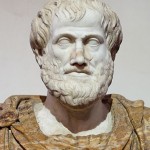Theology, everyone knows, is the study of things divine, or, at least, the study of things human beings have called divine. More cynically, one might say that theology is what is taught in the theology departments of large universities, or in other words, things that men have made up about God in order to get tenure.
But Catholic theology, properly understood, is no such thing. In Catholic terms, theology is the study of the God who is, a God who isn’t merely a subject to be studied but a person (three persons) to be known. And like all kinds of knowing, it begins in wonder. As Pope Francis begins Paragraph 36 of Lumen Fidei:
Since faith is a light, it draws us into itself, inviting us to explore ever more fully the horizon which it illumines, all the better to know the object of our love. Christian theology is born of this desire.
Faith in God is a light to our path; that has been the gist of Lumen Fidei so far. But that light doesn’t illuminate only the path: it spreads a pool of light, and makes much visible to us that would otherwise go unseen. If we look, we begin to see; and since what is illumined is of God, we will look insofar as we love God, because we want to know our beloved. And this is the source of truly Christian theology: the desire to know, to understand, to communicate that which we see of God with the eyes of faith.
It is not something we make up; theology must be grounded in the reality of the God we are coming to know, just as physics must be grounded in the physical world we are coming to know. And this requires humility: we must be willing to learn from our subject:
The great medieval theologians and teachers rightly held that theology, as a science of faith, is a participation in God’s own knowledge of himself. It is not just our discourse about God, but first and foremost the acceptance and the pursuit of a deeper understanding of the word which God speaks to us, the word which God speaks about himself, for he is an eternal dialogue of communion, and he allows us to enter into this dialogue. Theology thus demands the humility to be “touched” by God, admitting its own limitations before the mystery, while striving to investigate, with the discipline proper to reason, the inexhaustible riches of this mystery.
God is; and He is as He knows Himself to be. Through our faith, God begins to let us in on the secret. But we must trust Him. We must let our ideas be corrected by Him. And, as Catholics, that means that we must be subject to the teachings of the Church, which is guided by His Holy Spirit:
Theology also shares in the ecclesial form of faith; its light is the light of the believing subject which is the Church. This implies, on the one hand, that theology must be at the service of the faith of Christians, that it must work humbly to protect and deepen the faith of everyone, especially ordinary believers. On the other hand, because it draws its life from faith, theology cannot consider the magisterium of the Pope and the bishops in communion with him as something extrinsic, a limitation of its freedom, but rather as one of its internal, constitutive dimensions, for the magisterium ensures our contact with the primordial source and thus provides the certainty of attaining to the word of Christ in all its integrity.
In short, if you regard the magisterium of the Church as a hindrance rather than a help you’ve strayed from the path of Catholic theology.
This kind of intellectual submission is alien to American ideals, where every man is supposed to think for himself; and yet, you know, I see a lot of it out there on FaceBook and similar arenas—not submission to the things of God, mind you, but submission to things that are far less trustworthy: political parties, ideologies, and the like. But that’s another post.












